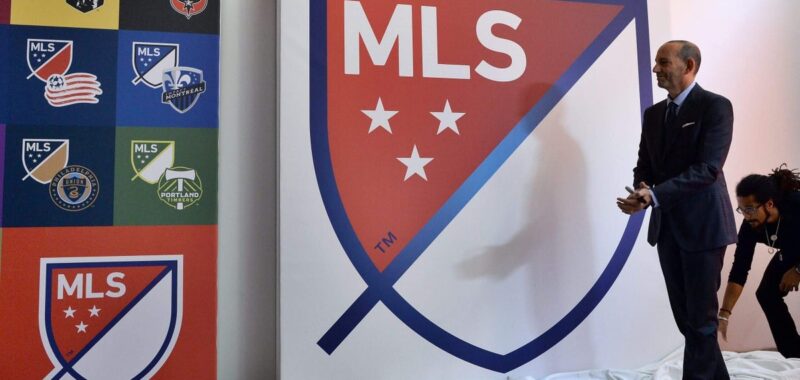One of the fiercest contests in American soccer in 2025 may not be waged on a pitch — but in a courtroom.
It’s been eight years since the North American Soccer League first filed an antitrust lawsuit against the United States Soccer Federation. After years of litigation and the case evolving to include Major League Soccer as a co-defendant, NASL is accusing the two organizations of conspiring against the lower-tier league, forcing it to fail.
The trial for their civil dispute is now underway in Brooklyn federal court, where dozens of lawyers have gathered since Monday for marathon, eight-hour days as they begin to argue their sides before a jury of 10. With more than $500million in damages on the line, the trial has the potential to pull the curtain on the quiet world of professional soccer in the United States at a time when the sport is the most popular it’s ever been.
The trial is expected to last three to four weeks in front of U.S. District Judge Hector Gonzalez of the Eastern District of New York — unless a settlement is reached sooner.
The proceedings promise to unravel details from the complicated web of professional soccer in the United States, with both sides painting vastly different pictures of the dispute.
The case hinges on the professional standards USSF follows to sanction leagues in the United States, which allow the governing body to designate levels like Division I, Division II or Division III, and whether the governing body unjustly denied NASL the status it sought.
NASL accused USSF and MLS of conspiring to prevent the league from competing with MLS by denying them Division I and Division II accreditation. USSF, they say, had a vested interest in MLS to do this because of the two sides’ deep ties through Soccer United Marketing, MLS’s commercial arm. This, NASL claims, unfairly led to the league ceasing operations in 2018.

MLS commissioner Don Garber (left) and former U.S. Soccer president Sunil Gulati (right) with ex-USMNT head coach Bruce Arena in 2017. (Kent Horner / Getty Images)
But USSF and MLS paint a vastly different picture, arguing that NASL’s failures were of its own making and likely related to its close ties with Aaron Davidson, a major NASL investor who was implicated in the 2015 FIFA bribery scandal. NASL, they argue, never met the standards required of a DI or DII league.
One of NASL’s lead attorneys is Winston & Strawn’s Jeffrey Kessler, who is no stranger to high-profile cases. He’s also no stranger to U.S. Soccer or its attorney in this matter, Christopher Yates of Latham & Watkins. The two were on opposite ends of the ongoing dispute between sports promoter Relevent and USSF.

GO DEEPER
Explaining Relevent Sports’ lawsuit against FIFA, U.S. Soccer
Major League Soccer is being led by Proskauer Rose’s Bradley Ruskin, who has represented nearly every men’s professional sports league in the U.S., including the NHL, NFL, NBA and MLB.
The trial began with a 135-minute opening statement by Kessler, who painted NASL as outsiders in the American soccer landscape despite the league’s apparent success toward the end of its six-season stint. He called American soccer a “small, insular world” that “you either belong (to), or you don’t.”
“The established soccer powers of this country — USSF and MLS — did not welcome the competition that NASL wanted to introduce,” Kessler said in court. “Instead, they entered into an agreement — a conspiracy — where they took the professional league standards and applied it in a discriminatory way to prevent us from competing.”
Yates instead touted the standards as the very reason for soccer’s current success in the United States. He told the jurors USSF was “wrongly accused in this lawsuit.”
“Professional leagues have gone leaps and bounds over the last 30 years. That’s not an accident,” Yates said. He later stressed, “Minimum standards helped fuel that growth.”
Meanwhile, Ruskin described NASL and MLS as leagues on very different scales, minimizing the potential that NASL was seen as a threat by MLS.
“NASL was just not on Major League Soccer’s mind,” Ruskin said. “NASL and MLS were operating in different universes, different stratospheres.”
The trial continues this week with witness testimony. NASL’s first witness was called Wednesday, with Rishi Sehgal, the league’s former interim commissioner, taking the stand for eight hours, including a tense cross-examination.

Former NBA superstar Carmelo Anthony was an NASL co-owner. (Brad Penner / USA Today)
Future testimony from other high-profile sports figures is expected, including retired NBA All-Star Carmelo Anthony (a former owner of NASL’s Puerto Rico FC) and Kansas City Chiefs CEO and FC Dallas owner Clark Hunt. Another key player is billionaire Rocco Commisso, who partly funds the lawsuit and in 2017 purchased a majority stake in the New York Cosmos, a former NASL club.
Insiders such as MLS commissioner Don Garber, USSF president Cindy Parlow Cone and former USSF president Sunil Gulati are also likely to take the witness stand, offering further insight into the mechanics of American soccer.
All three were in the courtroom for opening statements on Tuesday, with Garber and Gulati already on the receiving end of pointed attacks from NASL’s counsel.
(Top photo: Jewel Samad / AFP via Getty Images)

